“Serving in Silence” News Stories & Interviews
On this page is a collection of stories and interviews surrounding Serving in Silence: The Margarethe Cammermeyer Story.
Serving in Silence was a made-for-television movie that aired on NBC February 4, 1995 at 9:00 p.m., with Glenn Close in the title role. Close portrayed Colonel Cammermeyer—an Army nurse who received the Bronze star for her service in Vietnam—who declared herself a lesbian during a security clearance interview in 1989, which led to her discharge three years later. The script was by Alison Cross(“Without the love story,” Ms. Cross said, “I don't understand why Grethe would have said anything at all. That became the motivation that held the movie together.”)
Close shared executive producer credit for the movie with Barbra Streisand, Cis Corman, Neil Meron and Craig Zadan. Jeff Bleckner directed.
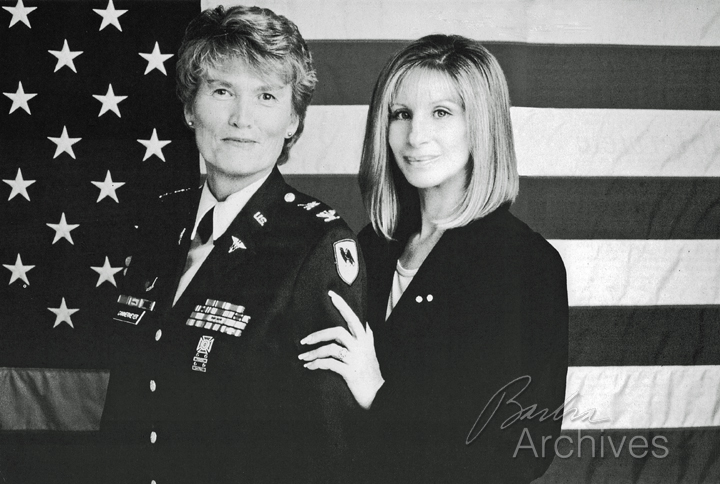
Q&A with Barbra Streisand
Barbra Streisand, Executive Producer, talks about Television, Margarethe, and her passion for the issue
What was your personal reaction to this case?
BJS: I’ve always believed in telling the truth, and I’ve found throughout my own career, that always got me into trouble. It reminds me of a line from Shaw’s play, “Saint Joan,” which says “He who tells the truth shall surely be caught.” By Grethe’s telling the truth, she was caught. That’s what is so unjust to me, that the truth should get you into trouble.
At what point did you decide that you wanted to make a film about this story?
BJS: As soon as I read about it. It’s just so unjust. We need every capable citizen to participate in this country’s military. The fight here is about a person’s right to die for his or her country, and it’s so absurd that the issue has become about who is gay and whether or not they can defend their country.
How would you describe Margarethe Cammermeyer?
BJS: I have great admiration for Grethe, who served honorably in the military for 26 years with an unblemished record, and had the courage to fight back when she was dismissed from the Army for being a lesbian.
Was it difficult to get this film made?
BJS: I think the networks were a little worried at first, but NBC came through, and TriStar was really good about getting it done right away.
What do you think Glenn Close brings to the role?
BJS: Dignity, intelligence, presence, integrity. All the things that Grethe has.
How do you feel about where we stand now with the law and the military because of this case?
BJS: “Don’t Ask, Don’t Tell” is something I don’t like, but it has advanced the cause a bit because the law was so unconstitutional that it has forced cases like Grethe’s and Keith Meinholt’s and Joe Stefan’s to come into the news and into the courts and be declared, so far, unconstitutional. Of course we don’t know what will happen when the cases come before the Supreme Court. I think, in a way, we are backward in this country, because, with all the countries that have integrated military—countries like Australia, Canada, Israel, France, Belgium, Sweden, Norway—without problems, why can’t it work here? That’s why each of us who cares about issues like this have to do a little part in some way to change it.
Was it a challenge to show that these people are not unlike everyone else?
BJS: I am very concerned with this issue of everybody’s right to love. I’m making a movie about it called “The Normal Heart,” which is a love story between two men set against the beginning of the AIDS epidemic. It’s very hard for me to watch this society being so intolerant to people other than those who exist in the kind of Ozzie and Harriet mode of what a family means. Everybody has a right to love and be loved by whomever he or she wishes.
Have there been things in your own life that helped you identify with Margarethe’s story?
BJS: As a Jew and as a woman, I can identify with those who have struggled against other’s intolerance. I feel a moral obligation to continue to fight against prejudice on behalf of all members of society.
Why did you choose television to tell this story?
BJS: Because we have the opportunity to reach millions of people. If we can help change some viewers opinions, make them less frightened of something they don’t understand, if they can look at this story and feel compassion and perhaps even anger at the military for this injustice, then it makes it all worthwhile. This whole issue of gays in the military is, to me, an issue of civil rights. lt’s about discrimination, fear, prejudice and narrow-mindedness, and I don’t think there is a place for that in a just society.
Do you think that people use television to learn?
BJS: I believe television is a wonderful medium. I think that there is a lot of learning being done on television. I watch PBS, C-Span, and in this case, I would certainly watch this NBC show. Pieces like “And The Band Played On” also have been wonderfully creative and informational and educational, and so it can be a very worthwhile medium.
What was Grethe’s first reaction when you approached her about making the movie?
BJS: If I remember correctly, when I first said “Do you want your life displayed on television?” she said “No.” Then we talked about it and Grethe was very complimentary in terms of trusting us to tell her story with dignity and honesty.
What do you hope comes out of this?
BJS: What I would like to happen is for people to identify with these people in the story, because we are really all so alike. We feel, we cry, we’re joyous, we want children, we want to be happy, we want to be loved, we want to be respected, and no matter what someone’s sexual orientation is, that doesn’t change. We are basically more similar than different. By telling this story, it hopefully will erode some of the stereotypical views about what gays and lesbians are like. We're all in this together—we’re all just humans.
World Premiere
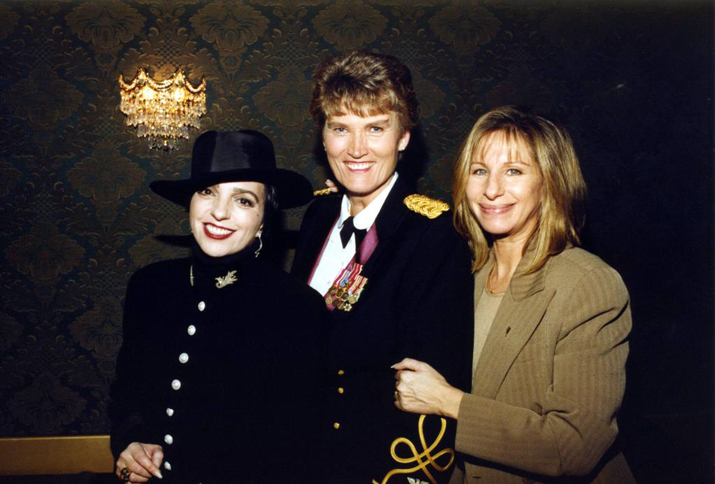
Above: Liza Minnelli, Cammermeyer, and Streisand
Streisand and Col. Cammermeyer joined executive producers Craig Zadan, Neil Meron, and Cis Corman to attend the world premiere of Serving In Silence at Cineplex Odeon Theatres in Century City, California on January 23, 1995. (Star Glenn Close could not attend).
Inside the theater, Barbra gave a short speech then introduced Col. Cammermeyer, who told the audience she had seen Yentl, and she thought Yentl would understand what it was like for her to be in disguise and speak the truth. Cammermeyer praised Close's portrayal of her by stating, “I think she's a good soldier,” and that she “managed to capture my naive belief in the system and my continuing belief that justice will prevail.”
Benefit organizers Lambda and GLAAD held the $50-$500 ticket premiere in two cinemas at 7:30 p.m. and 8:00 p.m.
Barbra and Col. Cammermeyer posed for photographers in the theater lobby.
After the screenings, guests and stars mingled in a restaurant nearby while photogs snapped more pictures of the festivities.
Among those who attended: Elliott Gould, Jason Gould, Marty Erlichman, Roslyn Kind, Richard Baskin, Brenda Vaccaro, and Liza Minnelli.
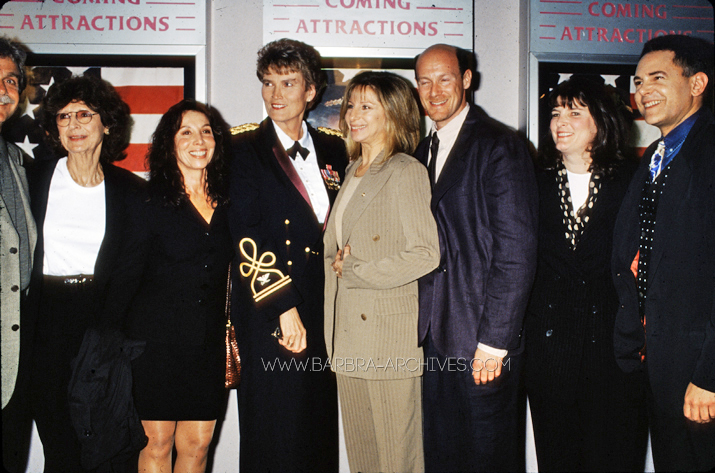
The Serving in Silence DVD actually contains, as a bonus feature, video footage of executive producers (including Streisand) speaking before the opening night audience, as well as Col. Cammermeyer's speech.
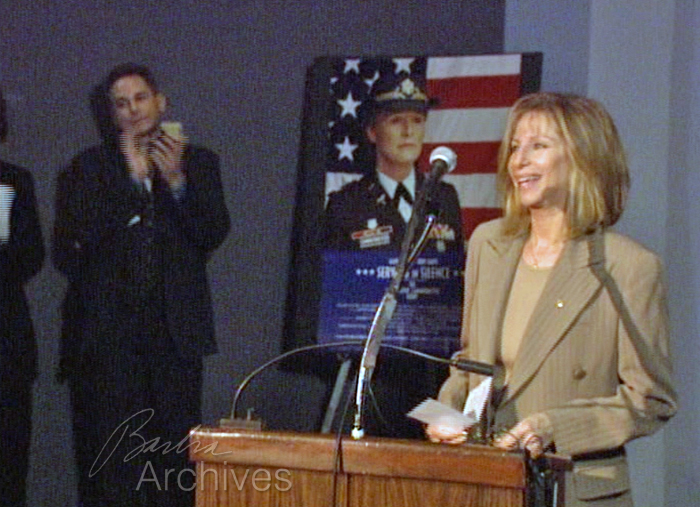
A Quiet Woman's Story With a Loud Message
February 2, 1995
By BILL CARTER
In all the publicity for "Serving in Silence," a made-for-television movie to be shown on Monday night on NBC, one name is mentioned most prominently: Barbra Streisand.
Ms. Streisand is not in the movie. She did not direct it. She is but one of five executive producers for the film. And yet when the announcer intones during promotional spots that the movie is "from Barbra Streisand," there is more than name-dropping involved.
Ms. Streisand initiated the project; she helped put together its creative team; she had a hand in recruiting the other big star associated with the movie, Glenn Close, to play the lead role. Most important, she convinced the real-life subject of the film, who was reluctant to have her private life turned into a network movie of the week, that, as Ms. Streisand put it in a telephone interview, "this was about education, about trying to change some people, about opening minds."
Ms. Close plays Col. Margarethe Cammermeyer, a highly decorated career military officer who was discharged from the Washington State National Guard in 1992, despite her exemplary service record, because during an interview for security clearance she answered yes when asked if she was a lesbian. She was apparently the highest-ranking officer ever to be discharged solely because of sexual orientation, and the case received wide publicity.
Colonel Cammermeyer had ignored a long list of Hollywood people interested in turning her story into a movie. Then Columbia Tri-Star Studios called and said that they were also interested, and that they were working with Barbra Streisand.
"I recognized the name," Colonel Cammermeyer said at a news conference last month.
Ms. Streisand said the idea of someone's being punished for scrupulous honesty had special, even personal resonance for her. "When I was about 13 years old, I went into New York to audition for a radio workshop," she recalled. "I had to do a soliloquy from Shaw's 'Saint Joan.' And there was a line in it that has always stayed with me. The essence of the line was: 'He who tells the truth shall surely be caught.' "
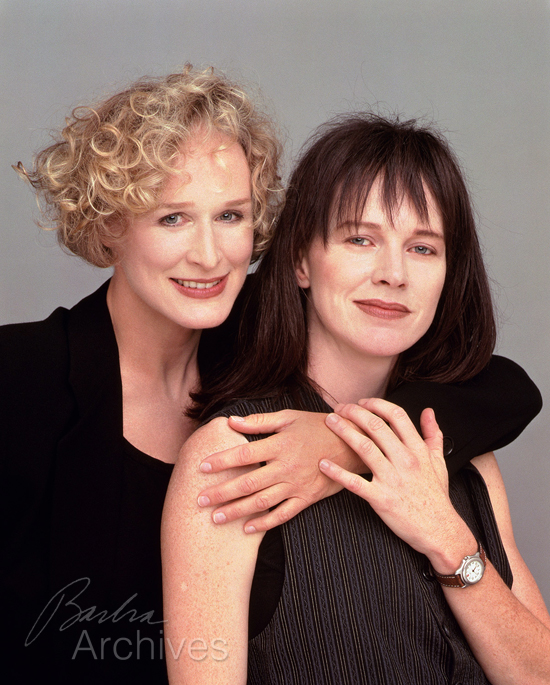
In Colonel Cammermeyer's case, the injustice of being caught telling the simple truth about herself seemed "pretty absurd," Ms. Streisand said. "This was a privacy issue. This was a person fighting for the right to die for her country."
Almost immediately after reading news accounts about the case Ms. Streisand said she had called her producing partner, Cis Corman, and told her: "We have to do something about this. We have to tell this story."
Quickly a production team, which included two independent producers, Neil Meron and Craig Zadan, was put in place. Ms. Streisand invited Colonel Cammermeyer to her home in Los Angeles. "When I met her I was totally impressed," Ms. Streisand said. "She had great dignity and integrity. She is such a handsome woman."
With the colonel's cooperation secured, Ms. Streisand took the project to Helen Verno, the head of television movies for Columbia Tri-Star, where Ms. Streisand has a production deal. "Barbra's excitement was the key factor," Ms. Verno said.
It surely did not hurt when Ms. Close signed on. Ms. Streisand said she thought of Ms. Close for the part as soon as she met the colonel: "Glenn has the same quiet kind of authority and presence. The same kind of cool reserve."
Ms. Close also became the movie's fifth executive producer.
Next Mr. Meron and Mr. Zadan met with Lindy DeKoven, the head of movies for NBC. After "quietly checking," as Ms. DeKoven put it, with NBC's sales department to make sure that a movie with a lesbian theme would not be boycotted, Ms. DeKoven made the deal. "Having Barbra and Glenn was obviously very important," she said.
For Ms. Close, the idea of a person "being incapable of telling a lie" was one of the many intriguing elements to the role. Then she met the colonel. "I was very, very impressed by her," Ms. Close said in a telephone interview from the Minskoff Theater, where she is starring in "Sunset Boulevard." "I wondered if I could get the military bearing because she's so tall and I'm so short."
Ms. Streisand said she never gave any thought to acting in the movie herself. "I like this role of producer," she said. "It's a very nice feeling to go to a set and not have to have your hair done. My role was to get the film made."
And to get its message across. "I care about social issues," Ms. Streisand said. "And the way I can speak out is in my work."
Colonel Cammermeyer was reinstated to her position with the National Guard last summer after a Federal judge found that the military's 1992 policy on homosexuals was based on prejudice and violated the Constitution's equal-protection clause. That ruling is under appeal by the Clinton Administration.
For all its serious considerations of the issue of homosexuality in the military, "Serving in Silence" is more about "love and work and family," Ms. Streisand said. Indeed, the main focus of the film is on Colonel Cammermeyer's relationship with an artist named Diane, played in the film by Judy Davis.
Both Ms. Streisand and Ms. Close praised Ms. Davis's performance. "She was sublime to work with," Ms. Close said. Playing a love story opposite another woman was not hard, she said, because "I basically think if you fall in love with somebody, the feeling of love is the same."
Much of the attention that has surrounded "Serving in Silence" has focused on a scene late in the movie in which Ms. Close tenderly kisses Ms. Davis. Ms. Close said NBC did not raise a single objection to the scene. Still, she said, "We walked a very fine line. For network television you can only push the envelope so far."
Both women said they were not only proud of the film but also respectful of what Ms. Streisand called "the overwhelming power of television." Ms. Verno said that the same behind-the-camera creative team, including Ms. Streisand, would work together on a second television project now being developed. She would not say what it was.
Ms. Streisand said she would also explore some related themes, like "the issue of basic human values," in a movie version of Larry Kramer's play "The Normal Heart" for theatrical release. The subject is AIDS.
"That's not a movie the studios are clamoring to do," she said. "But I'm plowing ahead. I'll probably direct it."
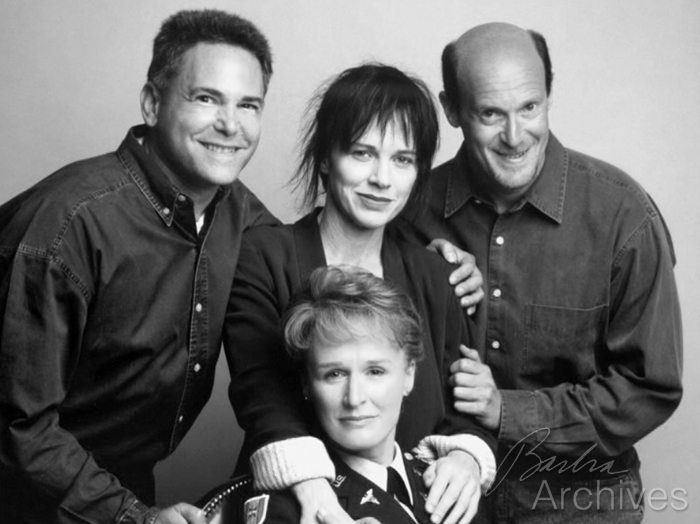
(Above: Zadan, Davis, Close, and Meron)
RSVP : A Hollywood Salute to a Good Soldier
January 25, 1995|BRIDGET BYRNE | SPECIAL TO THE TIMES
Resplendent in dress uniform, Col. Margarethe Cammermeyer stood tall and calm amid the push-and-shove Hollywood hoopla at the Monday night premiere of "Serving in Silence: The Margarethe Cammermeyer Story," in which she is portrayed by Glenn Close.
The biographical movie, which will air on NBC on Feb. 6, tells the story of Army officer Cammermeyer's discharge in 1989, when she declared herself a lesbian, and her battle for reinstatement, now being appealed by the Army after a federal court ruled in her favor last year.
Before the screening, Cammermeyer addressed members and supporters of the two organizations benefiting from the event, the Gay & Lesbian Alliance Against Defamation and the Lambda Legal Defense and Education Fund. "Despite the book, despite the movie, I'm still a private person," she said, "but I feel my story transcends the individual experience to talk about people's love of country and what they must do to preserve human dignity and civil rights."
A standing ovation greeted Cammermeyer, the highest-ranking officer ever to be discharged from the U.S. military because of sexual orientation, and the audience showed equal enthusiasm for Barbra Streisand, one of the movie's executive producers.
"Excuse me for pushing, but it's not often you get to see Barbra Streisand," said one woman, as fans tried to hone in on photo opportunities.
At the very crowded post-screening reception, Cammermeyer bent her knees as Streisand stood beside her on tiptoe to try to match the Army nurse's 6-foot frame. And she threw an amused sidelong glance when she found herself with Lypsinka garbed in a red bobbed wig and a copy of the famous see-through pantsuit Streisand wore when she won the Oscar for "Funny Girl."
"I thought the movie was fantastic. I wanted to cry, but my eye-makeup would have run," Lypsinka said.
"I think she's a good soldier," said Cammermeyer of Close, praising the performance and remarking that the actress "managed to capture my naive belief in the system and my continuing belief that justice will prevail."
Enthusiasm ran high for the movie, although some murmuring was heard wishing Close and her co-star Judy Davis had been seen to kiss earlier in the film and more than once. However, Diane Divelbess, Cammermeyer's partner, said she felt flattered by the performance. Tom, 18, the youngest of Cammermeyer's four sons, said the movie, "was better than I thought it would be."
"We're all human. We all need love," said Streisand, noting that the film expands the concept of family.
Present at the event were Streisand's former husband, Elliott Gould, and their son, Jason, as well as her longtime friend Richard Baskin; Lisa Kudrow, Matt LeBlanc and Matthew Perry of the NBC sitcom "Friends"; Jon Voight, Brenda Vaccaro, Liza Minnelli, NBC's production veep Lindy DeCoven, and the movie's co-executive producers Neil Meron, Cis Corman and Craig Zadan.
"Thank God for Barbra and Glenn" said Zadan. "We hear so much about the bad aspects of star power, but getting this movie made is a perfect example of how star power can be a force for good."
Emmy Awards
WINS:
- Glenn Close — Lead Actress, Miniseries or a Special
- Judy Davis — Supporting Actress, Miniseries or a Special (tie with Shirley Knight)
- Individual Achievement, Writing, Miniseries or a Special
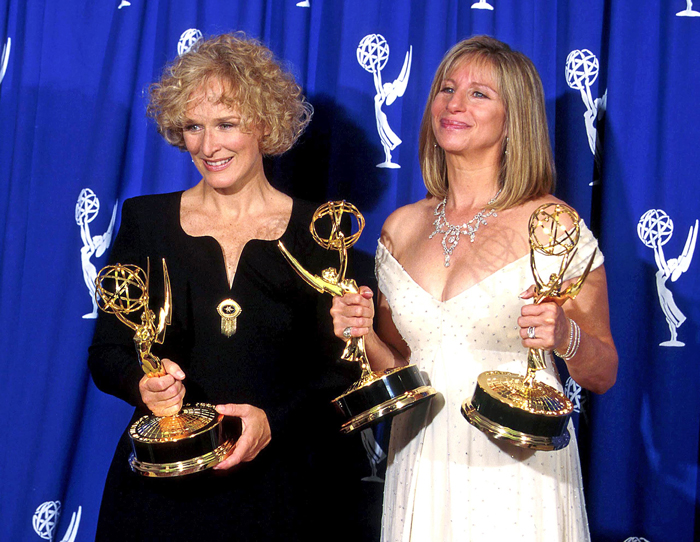
Above: In the Emmy press room, Close and Streisand hold Emmy Awards—Streisand won hers for Barbra: The Concert on HBO, which aired that year, too.
At the 1995 Emmy Awards, Barbra said: “I'm very proud of that show. It's wonderful to have a passionate feeling for a subject. I feel that gays and lesbians who want to serve in the military are really fighting for the right to die for their country. It's really one of the most important and powerful issues of our time, and I was really glad that television was willing to tackle a subject like this in primetime ... I'm only sorry it didn't win ....”
END.
Thanks for help on this page: Allison Waldman, Christophe Blondel
Related Link:
